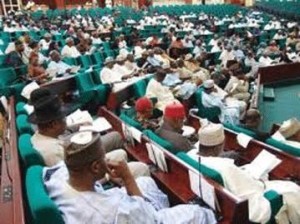The House of Representatives on Wednesday began a fresh process for the passage into law of the Electoral Act (amendment) bill, 2018 and the Nigeria Peace Corps bill, 2018.
President Muhammadu Buhari had withheld assent to both bills recently and the House promised to re-gazette them with 18 others.
Both bills were passed for first reading today, meaning that vetoing president’s assent on them would take a little longer than expected.
While the Peace Corps bill 2018, was sponsored by Rep. Farouk Abdullahi (Kebbi-APC), the Electoral Act (amendment) bill 2018, was sponsored by Rep. Sunday Karimi (Kogi-PDP) with seven other lawmakers.
The House had said that it would re-gazette the rejected amendment to the Electoral Act, the Peace Corps bill and 18 others and re-transmit to the president for assent.
The House had also agreed with two of the reasons advanced by the president for withholding his assent to the Electoral Act amendment and promised to expunge the items before re-transmitting the new election sequence.
On the Peace Corps bill, the House did not, however, agree with the reasons advanced by the president for rejecting it.
The areas the House agreed with the president are the amendment to section 138 of the principal Act to delete two crucial grounds upon which an election could be challenged by candidates and “the amendments to section 152 (3) – (5) of the principal act.
Chairman of the House Committee on Media and Public Affairs, Rep. Abdurazak Namdas, had explained that by legislating on the sequence of elections, the House had not infringed on the powers of the Independent National Electoral Commission (INEC).
He said, “The president has actually written to us and withheld assent to the Electoral Act and stated his reasons for doing so.
“I want to say that as a responsible parliament, we’ve agreed with two of the three reasons given by the president.
“We agreed with the first one that the amendment of section 138 of the principal Act to delete two crucial grounds upon which an election may be challenged by candidates unduly limits the rights of candidates in elections to a free and fair electoral review process.
“On this, we have agreed with the president.
“We have also agreed with the reason advanced that the amendment of Section 152 of the principal Act, which raises constitutional issues over the competence of the National Assembly to legislate over local government elections.
“This too we have agreed with. We know that we don’t have the power to act on that.”
On election sequence, the spokesman said “however, we are in disagreement with the president over his first reason, which states that sequence of election in Section 25 of the principal Act may infringe on the constitutionally guaranteed discretion of INEC to organise, undertake and supervise all elections provided in Section 15 (a) to the third schedule of the constitution”.
He explained that “Our reasons for disagreeing on this matter is that you look at section 4 of the Legislative Powers Act, item 22.
“Let me quote. It states that: `The National Assembly has powers over elections to the offices of president and vice president, or governor and deputy governor and any other office to which a person may be elected under this constitution, excluding elections into a local government council or any office in such council.”
At plenary on Wednesday, presided over by the Speaker, Mr Yakubu Dogara, the two bills and 18 others were passed through first reading, preparatory to be slated for second reading. (NAN)














